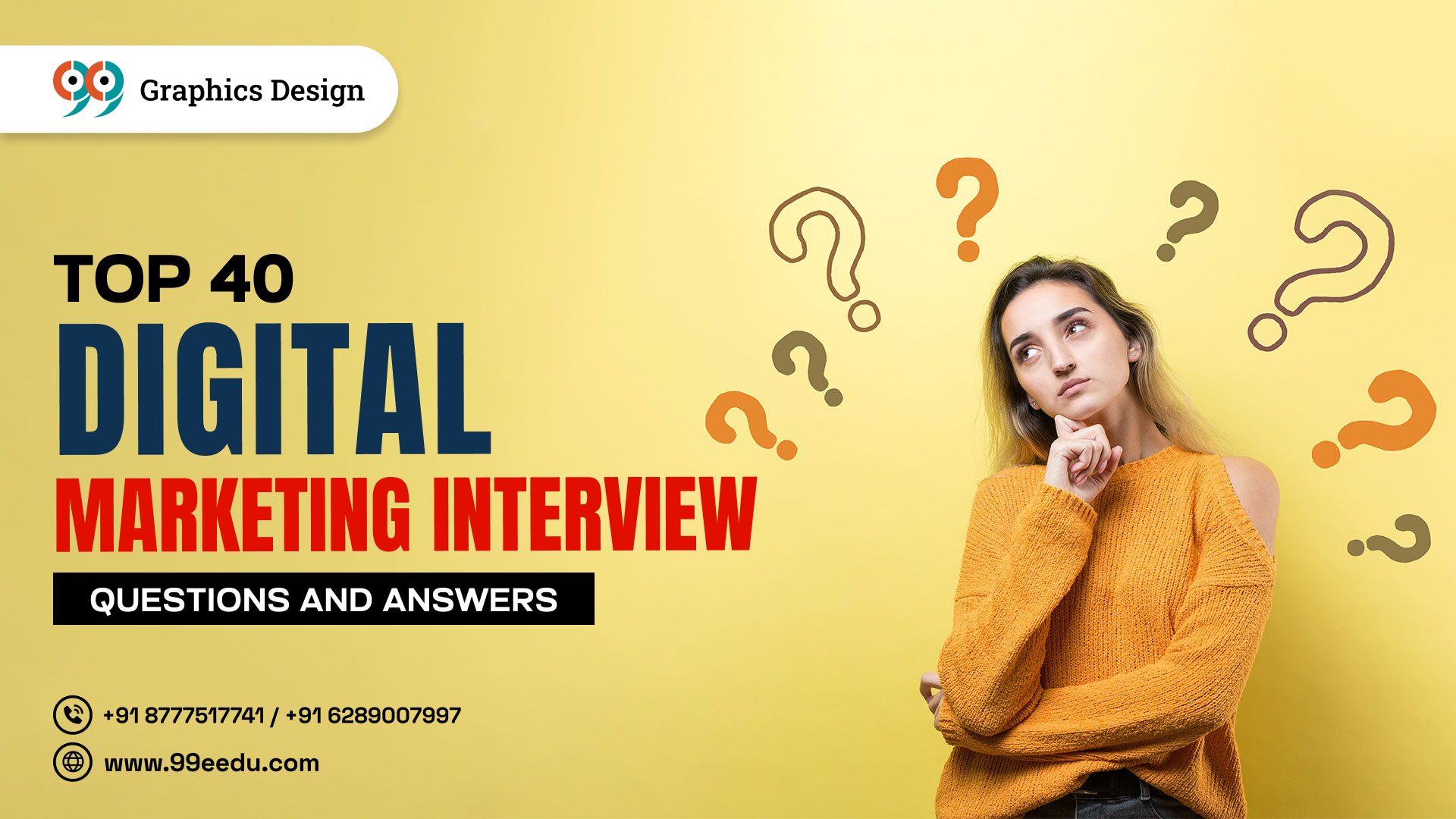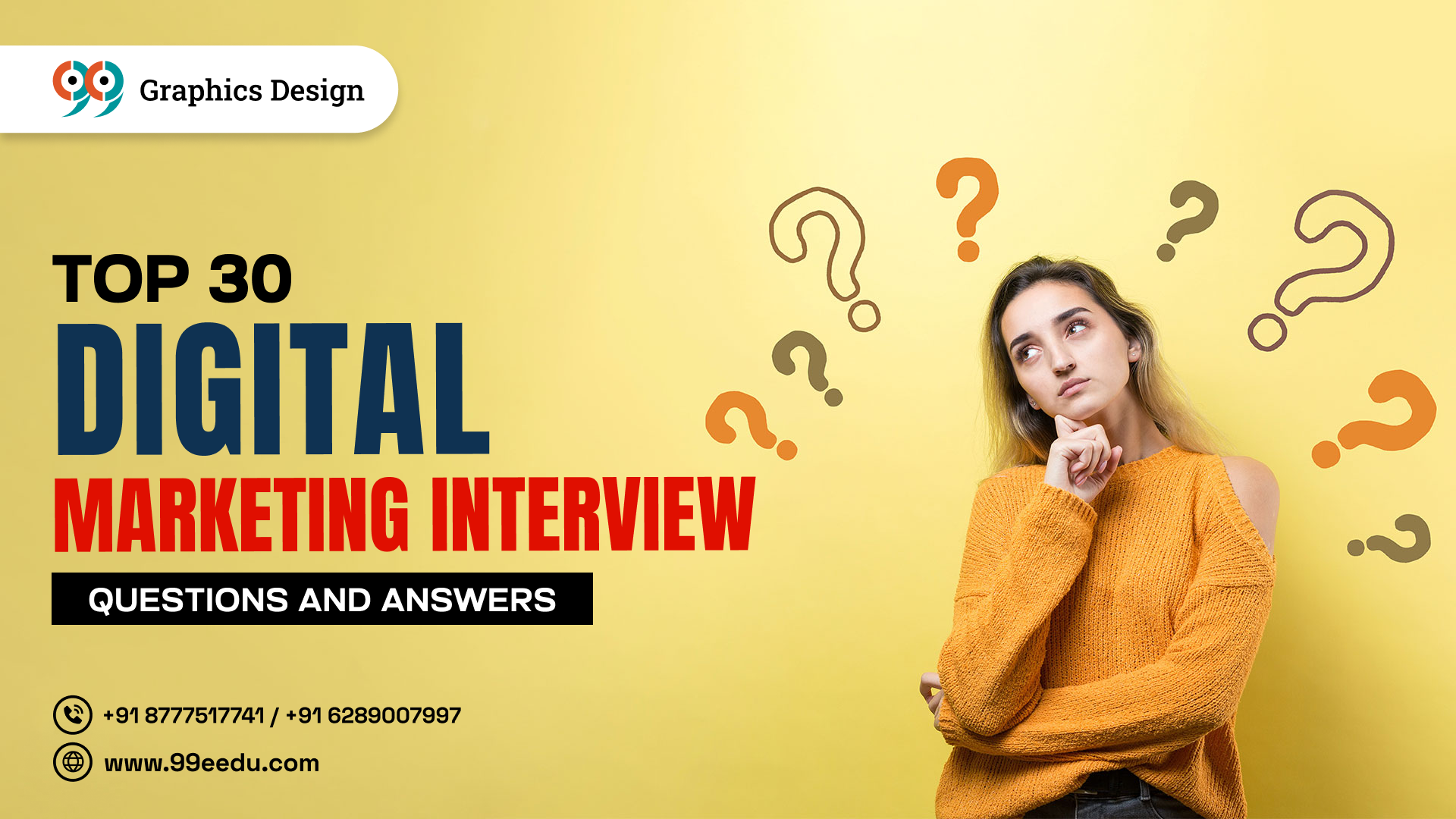In the process of interview preparations, these tips would help any digital marketer in checking his or her preparedness in such a dynamic field. In this guide, we will take a look at some of the top Digital Marketing Interview Questions you must prepare before going for a job interview. From learning about link building to knowing how to handle social media and analyzing results let us now start with what it takes to become a great digital marketer, and how you should prepare for your interview.
It is common knowledge that digital marketing has become one of the most in-demand skills in today’s world. Whether you are a newcomer to the digital marketing career looking for an opportunity or an experienced professional in search of a promotion or a new job, it is crucial to refresh your memory of what questions may be asked during the interview. This guide provides the best 30 Digital Marketing Interview Questions our recruiters look for and probing answers for successful interviews.
1. What is Digital Marketing?
Digital marketing can be defined as the strategy involving the use of websites, social media, e-mails, and search engines to advertise products or services. The first objective focuses on generating traffic and persuading customers on specific products through online platforms.
2. Why is Digital Marketing Important?
Digital marketing is essential since it helps organizations to cover extensive markets economically and at the same time, the gains can be checked. Digital strategies are real-time ones that allow targeting an audience without a broad reach, unlike traditional ways.
3. Distinguish Between the Four Categories of Digital Advertising
There are several types of digital marketing:
1. Content Marketing:
Centred on building and disseminating useful information.
2. SEO (Search Engine Optimization):
Enhances the probability of its content to feature at the top of search engines.
3. Social Media Marketing:
Has the marketing strategy of using social platforms for promoting its products and for the interaction with the consumers.
4. Email Marketing:
Engages customers via email.
5. PPC (Pay-Per-Click):
Any advertisement placed on internet search engines such as Google and Yahoo.
4. What is SEO, and Why is It So Crucial?
It Stands for Search Engine Optimization, SEO is the act of optimizing certain pages or the entire website to attract good referral traffic pointing towards the website. SEO is important because it seeks to make websites visible, attract traffic to websites, and gain credibility.
5. Define Content Marketing
It means that content marketing could be described as the act of creating and distributing valuable, relevant, and reliable content to the target population. The main goal is straightforward: to create trust and motivate the customers to a customer-profitable behaviour.
6. What is PPC?
PPC stands for Pay Per Click, It is a form of Internet marketing where businesses pay the amounts every time a person clicks on an advertisement. People use it to pay for traffic to their sites instead of getting them naturally.
7. Basically, what is Social Media Marketing?
Social media marketing is a form of internet marketing that involves using social networking sites to sell goods or services, or to draw attention to particular brands. We are using websites such as Facebook, Twitter, LinkedIn, and Instagram to reach out to audiences and raise brand awareness.
8. First, let us define what keywords in digital marketing are.
Cues are specific words or cues that can be inserted by a user in search engines any time they are searching for information. It shows marketers what the user wants to achieve and enables them to create content that will address the users’ needs.
9. What is a Landing Page?
Landing pages, on the other hand, are single web pages whose primary use is within a marketing or advertising instance. It aims to help prospective consumers turn into clients or sale leads, as well as call to a specific task.
10. Analyze the Position of Analytics in Digital Marketing
Marketing metrics include the study of user behaviour so that marketers can evaluate their results. Analytics solutions such as Google Analytics show marketers the traffic statistics, conversion rates, and other parameters to make better decisions.
11. This paper seeks to determine the importance of email marketing.
According to several forms of digital marketing, email marketing continues to be among the most popular because this platform allows marketers to directly communicate with customers. Therefore, there are opportunities to cultivate the leads, build brand recognition, and convert those leads to customers by communicating with them directly.
12. Define Influencer Marketing
In general, influencer marketing can be described as a strategy of associating with people who are likely to engage the target consumers or potential purchasers. In this case, guests allow brands to reach out to even bigger and more responsive audiences through influencers.
13. How Then Does Affiliate Marketing Work?
In affiliate marketing, the merchant pays a commission to an affiliate whenever the latter brings traffic or sales to the merchant’s site. Commission can be tracked with links provided to the affiliate program which means that affiliates draw their payment from the customer they bring in.
14. What can be considered as Some Popular SEO Strategies?
Some of the best SEO strategies include the following; keyword research, optimizing content about specific keywords, and backlinks, increasing website speed, and mobile friendliness.
15. What does CTA mean?
A CTA is also a call to action which is an invitation to the consumer to take a particular action by phrases like ‘Buy Now,’ ‘Sign up for today,’ or ‘Read more.’ These are crucial in helping in turning visitors into customers given that CTAs help in leading the visitors through the buyer’s cycle.
16. This paper aims to expand on the differences between B2B and B2C marketing.
Marketing to businesses is called Business to Business (B2B) marketing and marketing to individuals is called Business to Consumer (B2C) marketing. B2B usually involves more time selling to the business while B2C can be a more impulsive decision-making process.
17. What is Remarketing?
Remarketing focuses on users, who have visited your site before but did not complete a purchase or other desired action. Displaying advertisements to them on other related sites helps a business hope for a future conversion.
18. Explain Customer Lifetime Value ( CLV )
CLV is the total amount of cash that can beิตapped or earned out of a given customer over some time. Knowledge of the CLV shows where to allocate marketing efforts and to target clients with more value.
19. What is a Marketing Funnel?
A marketing funnel is a model that was developed to depict the buying process hence the utilizers of this model endeavor to show how the consumers go through the buying process. It often comprises the stages of awareness, consideration, conversion, and loyalty assisting the marketer to reach customers at every stage.
20. Explaining what Conversion Rate Optimization is all about
CRO is focused on improving a Web site or a landing page to increase the overall conversion rate of visitors – the proportion of those that will sign up or buy, for example.
21. What is a Buyer Persona?
A buyer persona is best described as a semi-fictional description of your perfect customer. It has customers’ demographic data, their behaviour, motives, and objectives, which aids the marketer in planning and selling.
22. What instruments do you employ in digital marketing?
Some examples of tools are Google Analytics, SEMrush, Ahrefs, HubSpot, and Hootsuite which operate for an array of purposes including, but not limited to; SEO, SM, EM, and Analytics.
23. In this article the author sought to answer the following question: how do you measure success in Digital Marketing?
Both qualitative and quantitative benchmarks are known as key performance indicators (KPIs) where success can be identified through conversion rates, traffic, engagement, return on investment & click-through rates, etc. Some of these measurements give information about how the specific campaign in question performed and what was lacking.
24. What is A/B Testing?
A/B testing involves the comparison of the performance of two different formats of a web page or ad. It also helps the marketers of the firm to make the right decision and also to make sure that the content on their pages is well-optimized.
25. Modern Society and its Relationship with Technology
A digital marketing manager ensures the coordination of the overall planning and implementation of any marketing online. This incorporates such duties as being able to manage a whole team, setting budgets, being able to analyze performance as well as determine if it is in line with the business objectives.
26. To answer the question let’s first understand, what is programmatic advertising.
Programmatic advertising is the process of purchasing digital ads through the use of artificial intelligence, and real-time bidding. It makes advertising placements more effective because the right advertisements about the product can get to the right people at the right time.
27. What are the general difficulties in digital marketing?
This can be in respect of issues such as; changes in algorithms, data privacy practices, measurement of return on investment, and ad-blocking technology.
28. In this case, all forms of communication have been replaced by digital touch, and the same applies to the way people stay informed about the field.
Because of this, marketers read industry blogs, attend webinars, engage in online courses, and network with other marketers.
29. What is the Difference Between On-Page and Off-Page SEO?
There is a part of SEO that is done within a website, for example by using keywords in texts or META tags, this is called On-page SEO when the elements of the website are optimized for SEO, the second type of SEO is Off-page SEO, this is done outside the website, for example by providing quality backlinks or by getting signals from social media.
30. How Do You Handle Negative Feedback on Social Media?
As with every profession, responding to negative feedback calls for diplomacy and much understanding. Be timely, be empathetic, be problem solving-oriented, and do not argue with the writer. If you are transparent, you can always with empathy turn a negative encounter into a positive one.
Key Facebook Ads Digital Marketing Interview Questions and Answers
Most businesses incorporate Facebook Ads into their SEO marketing campaigns because it provides the perfect platform through which to target an audience. During an interview, recruiters tend to provide you with practical questions regarding Facebook Ads mechanics, strategies, and optimization tricks. The following are some typical questions people have about Facebook Ads, which might help you prepare better.
1. What Facebook Adverts Are, and Why They Matter
Facebook Ads are ad placements that can appear in the News Feed, in the Messenger, on Facebook and product sites, Instagram among others. They are important because through it companies can target individuals, topics, and actions, which makes advertising very effective and affordable.
2. What are some of the available Facebook ad formats?
There are several types of Facebook Ads, including:
Image Ads: Straightforward banner advertisements that are one image and can appear in a user’s feed.
Video Ads: Forcing information delivery that is appealing in the form of videos.
Carousel Ads: Interactive ads that embrace several images or videos that switch from one screen to the other when the user swipes.
Slideshow Ads: Temporary images built around or short clips of a commercial.
Collection Ads: Enables the user to shop through products without leaving the ad.
Lead Ads: It gathers leads right where users are on the Facebook platform, specifically for sign-up or registration.
3. What is Facebook Ad Auction and how does it function?
All the ads you create through the Facebook Ads service are auction-based. Publishers offer ad spaces and advertisers place their offers, and not always the highest offer the chosen one. The auction considers three main factors:
Bid Amount: How much value the advertiser is willing to place in the advertising media.
Estimated Action Rates: The chance that the consumer will interact with the ad.
Ad Quality and Relevance: This is a score of quality determined by users’ engagement and relevance to the audience or their feedback.
Facebook uses these factors to identify the winning ad for a particular user.
4. How do You Target the Right Audience for Facebook Advertising and Promotion?
Choosing the right audience involves using Facebook’s detailed targeting options, such as:
Demographics: Age, gender, location, etc.
Interests: Pages users such as hobbies and so on.
Behaviours: Consumer buying behaviour, mobile devices, etc.
Custom Audiences: Existing customer databases or website hits are some most important data that need secure upload.
Lookalike Audiences: Cogoing users who are similar to those who are already using you.
By identifying its target audience and with these criteria, placement can be more specific, and ad-rate effectiveness is enhanced.
5. What is a Lookalike Audience?
A Lookalike Audience is a technique of advertising that helps to show your ads to new people who are likely to be your clients. Facebook develops this audience by looking for users with similar traits to your source audience: the people on your email list or those visiting your website. It is particularly common because it is one of the best ways of getting to potential clients who could be interested in the brand.
6. How to Check the Effectiveness of a Facebook Advertisement?
Facebook provides various metrics to measure success, including:
CTR (Click-Through Rate): Thus it shows how attractive the ad is.
CPC (Cost Per Click): Offers the probability of measuring the cost efficiency of ad clicks.
CPM (Cost Per 1,000 Impressions): Cuts cost by evaluating impression as the parameter of cost efficiency.
Conversion Rate: Measures the number of users who engaged in the expected behaviours.
ROAS (Return on Ad Spend): Determines the amount of revenue produced for each expenditure made on ads.
The specific number to measure is different, depending on what kind of campaign is being run: brand building, customer acquisition, or direct response.
7. What is the Facebook Pixel? What does it do, and how does it do it?
The Facebook Pixel is a tracking code that you embed on your website so that you can monitor the effectiveness of the Facebook Ads campaign. It helps determine how well your campaigns are performing and gives statistics that can be used to target users that have been to your site, setting up custom audiences, as well asặting.
8. How can you further Facebook Ads to improve its performance rates?
Optimizing Facebook Ads involves several tactics:
A/B Testing: Try new pictures, messages, buttons, and target populations to discover what is most effective.
Adjusting Targeting: Hopefully, the targeting criteria should be adjusted or Lookalike Audiences should be used.
Improving Ad Quality: Concentration and proper optimization of engaging videos, copy of advertisements, and the call to action buttons.
Analyzing Data: Expertise in identifying Unsatisfactory and Poor performance areas and changing tactics accordingly.
Budget Optimization: Increase spend for effective ads and advertisements.
9. Why is Ad Relevance Score an Important Factor?: Impacts on the Performance of Advertising Campaign
Facebook’s ad relevance score is an efficiency metric that shows how cohesive the target audience is with the ad; replaced by Quality Ranking, Engagement Rate Ranking, and Conversion Rate Ranking. A high relevance score is likely to bring down the cost and enhance the ad positioning while a low score the contrary brings up the costs as well as diminishing the advertisement coverage. The second method of optimization is to maximize relevancy and make your ad as attractive as possible.
10. In this article, you’ll learn about custom audiences, in particular, what they are and how you can use them in promoting a business through Facebook advertising.
Custom Audiences look to target specific users that have had an interaction with your business in some form or another; like visiting your website, submitting an email for a newsletter, or sharing content. With Custom Audiences, it is all about remarketing since people who have had an initial interest in your company and products can be targeted repeatedly.
Key Google Ads Digital Marketing Interview Questions and Answers
1. What Is Google Ads, and How Does It Work?
Google Ads (formerly Google AdWords) is an online advertising platform by Google where advertisers bid to display ads on Google’s search engine results pages (SERPs), YouTube, and partner sites. It operates on a pay-per-click (PPC) model, where advertisers pay when users click their ads. Google Ads uses an auction system to determine ad placement, considering factors like bid amount, ad quality, and relevance.
2. What Are the Different Types of Google Ads Campaigns?
Google Ads offers several campaign types, including:
- Search Campaigns: Text ads displayed on Google search results pages.
- Display Campaigns: Visual ads are shown across the Google Display Network.
- Video Campaigns: Video ads played on YouTube and other Google video partners.
- Shopping Campaigns: Product listings that appear on Google Shopping.
- App Campaigns: Ads designed to promote mobile app installs or engagement.
Each campaign type serves different objectives, from driving conversions to building brand awareness.
3. How Does the Google Ads Auction Work?
The Google Ads auction determines which ads appear for a given search and in what order. It considers:
- Bid Amount: The maximum amount the advertiser is willing to pay per click.
- Quality Score: A score from 1-10 based on ad relevance, expected click-through rate (CTR), and landing page experience.
- Ad Rank: A combination of bid and Quality Score, determining an ad’s position.
Higher Quality Scores lead to better ad placements and lower costs.
4. What is Quality Score, and How Can It Be Improved?
Quality Score is a measure of the quality and relevance of ads, keywords, and landing pages, rated from 1 to 10. A higher Quality Score reduces costs and improves ad positioning. To improve Quality Score:
- Optimize Ad Relevance: Use keywords that closely match user intent.
- Enhance CTR: Craft compelling ad copy with strong CTAs.
- Optimize Landing Pages: Ensure the landing page is relevant, fast-loading, and mobile-friendly.
5. Explain the Difference Between CPC and CPM Bidding
- CPC (Cost Per Click): The advertiser pays only when someone clicks the ad, commonly used for driving direct traffic.
- CPM (Cost Per Mille): The advertiser pays per 1,000 impressions, regardless of clicks, often used for brand awareness.
Choosing CPC or CPM depends on the campaign’s objective, with CPC favoured for conversions and CPM for visibility.
6. What Are Negative Keywords, and Why Are They Important?
Negative keywords prevent ads from showing for specific search terms, allowing advertisers to filter out irrelevant traffic and improve campaign ROI. For instance, a luxury watch brand might use “cheap” as a negative keyword to avoid showing ads to budget-conscious searchers. Proper use of negative keywords increases ad relevance, improves CTR, and reduces wasted ad spend.
7. How Do You Measure the Success of a Google Ads Campaign?
Success in Google Ads can be measured using metrics like:
- CTR (Click-Through Rate): Indicates ad engagement and relevance.
- Conversion Rate: Measures the percentage of clicks that lead to desired actions, like purchases or sign-ups.
- ROAS (Return on Ad Spend): Calculates revenue generated per dollar spent.
- CPC (Cost Per Click) and CPA (Cost Per Acquisition): Track the efficiency of spending on clicks or conversions.
Key Social Media Digital Marketing Interview Questions and Answers
1. What is Social Media Marketing, and Why is it Important?
SMM is the process through which content is posted on social media platforms to the target audience with the intention of marketing or building a brand. It is important since it enables organizations to communicate with their target markets and generate awareness, visitors, and leads. Facebook, Instagram, Twitter, linkedイン social networks, and other channels have become unique advertising tools and possibilities to communicate with customers – these are some of the elements inherent in modern digital marketing.
2. What Are the Different Types of Content Used in Social Media Marketing?
In Social Media Marketing, content types vary based on platform and audience preferences, including:
Images: Interactive content such as videos, GIFs or images, funny memes, or exciting infographics.
Videos: GIFs, live videos, or stories.
Text Posts: Breaking news, educational, or entertaining notes and messages.
Stories: Short posts, for example, on Instagram and Facebook accounts or during the Day of action, campaign week, and so on.
Polls and Quizzes: Promoting interaction to generate interest.
User-Generated Content: Such content as reviews or photos that are created by users.
The particular forms used are also different, and each plays its role and meets certain preferences of the users, which is beneficial to the general SMM strategy.
3. What Factors Should You Consider While Deciding Which Social Media Site to Adopt by a Brand?
It requires the brand’s followers, objectives, and specialization field selection for a specific platform. For example:
- As you will note, thus, Facebook is good for the broad market place and the service provider has a wide variety of ad types that they can use.
- Instagram is perfect for sharing pictures and videos and targeting an audience under 35 years of age.
- LinkedIn is most suitable for B2B marketing and is an online professional network.
- A few fields in which tweets were found relevant are using Twitter for real-time updates and also for customer relations.
- TikTok serves the audience of young people with short and ultra-popular videos.
From this perspective, it becomes easy to know the most suitable platforms to share content where the target also spends a lot of time.
4. Social Media Engagement is defined as Improving Social Media Engagement depends on:
Social media interactions and activities are those established between brand pages and their followers through such features as likes, shares, comments, and mentions. Improving engagement involves:
Posting Consistently: Often posts help to maintain the audience’s attendance.
Using Interactive Content: Surveys, knowledge tests, and question and answer contests.
Engaging with Followers: Reactions to comments, direct messages, and mentions.
Running Contests and Giveaways: Increased engagement and gains new followers.
Using Hashtags: Astonishingly, the right hashtags will help increase the audience and its interest in the content.
A high engagement rate is always an indication of a many and active community following the brand.
5. Analyse why Social media Analytics is important
Social media analytics will respond with such information as content analysis, target audience, indicators, and others. It helps marketers understand which strategies need to be implemented, how to optimize the content, as well as how to get better results. Key analytics metrics include:
Reach: How many people mention the content?
Impressions: How often content is presented in front of the audience.
Engagement Rate: The extent of the involvement with content.
Follower Growth: Captures their amplitude fluctuations over time in terms of followers.
Click-Through Rate (CTR): Used to determine how effective the Calls to Action or links are.
These mean values can be used to understand and in a way optimize strategies for the improvement of the outcome.
6. What Hashtags Are and Their Application in Social Media Marketing?
Hashtags are words or phrases tagged with pound sign # it is a way to sort content and therefore amplify the content reach in social media. They assist the users in finding posts concerning various topics, which benefits marketers in extending their reach. For instance, appealing to a general or large audience and including trending business hashtags like #DigitalMarketing #FitnessTips can be useful, while using #BrandName or #CampaignName stimulates audience participation.
Huge attention should be paid to the choice of hashtags applicable to the context of the information and the issue of excessive use of the hashtags.
7. How Do You Handle Negative Comments or Reviews on Social Media?
Dealing with negative comments should be done very professionally and with a lot of patience. The steps include:
Responding Promptly: A shorter time taken to respond is evidence of the fact that the brand has value for customer feedback.
Staying Positive and Polite: Do not engage in confrontation with the participants and keep the appropriate pitch.
Offering a Solution: Respond to the concern and, if required further, transfer the discussion to a personal channel.
Learning from Feedback: This type of posting can help expose certain problems.
Efficient handling of negative comments benefits both the brand and the company’s consumers by changing dissatisfied customers into brand followers, and potential customers develop confidence in the brand assuming that their complaints and criticisms will be addressed.
8. What Are the Key Differences Between Organic and Paid Social Media?
Organic Social Media refers to content that a business posts to its social media platforms without paying for advertisement placement. They are most suited for loyalty management, follower management, and general branding and identity in social media.
Paid Social Media makes use of ads for a wide or select group of audience. It is good at driving certain objectives such as generating leads, traffic to the website, or visibility.
A point to note is that there is an organic and paid method in social media marketing and the two blend well.
9. What’s New in the Social Media Marketing Best Practices?
Some current trends include:
Video Content: Everything of smaller length but reels, live and stories command attention on almost bar graphs.
Influencer Marketing: Sponsoring influencers for targeting sparse niches.
Social Commerce: Promoting products without intermediaries through social networks.
User-Generated Content (UGC): As a marketing strategy, brands engage their followers and ask them to produce content.
Personalized Content: Work that is based on the specific needs of a person, like when one is studying a certain course online and the instructor or program creates information that will suit the student’s tastes or interests.
The trends inform marketers how they should proceed to ensure the content being created is exciting and engaging for the audience.
10. How Do You Measure the Success of a Social Media Campaign?
Campaign success can be measured using metrics aligned with campaign goals:
- Engagement Rate: This shows how actively the audience interacts.
- Reach and Impressions: Measures visibility.
- Conversion Rate: Tracks how many actions resulted from the campaign, like clicks or sign-ups.
- Follower Growth: Indicates brand interest and growth.
- Sentiment Analysis: Gauges the audience’s response tone (positive, negative, neutral).
Analyzing these metrics helps evaluate the effectiveness of social media efforts and inform future strategies.
Top Digital Marketing Digital Marketing Interview Questions
1. Why is Digital Marketing Important?
The first of many common Digital Marketing Interview Questions is about understanding the industry’s significance. Digital marketing connects businesses with customers online, where most spending and engagement occur today. An interviewee should explain how digital marketing strategies can build brand awareness, drive traffic, and increase revenue.
2. What Are the Different Types of Digital Marketing?
Among Digital Marketing Interview Questions, expect inquiries about different marketing channels. These include:
- SEO (Search Engine Optimization)
- SEM (Search Engine Marketing)
- Content Marketing
- Social Media Marketing
- Email Marketing
- Affiliate Marketing
3. Explain the Importance of SEO in Digital Marketing
SEO is a core concept, and understanding it well is crucial for any digital marketer. When asked about SEO in your Digital Marketing Interview Questions, talk about how it improves website visibility on search engines, leading to increased traffic and conversions. Be prepared to discuss SEO basics, keyword research, on-page and off-page SEO, and how they contribute to overall digital marketing efforts.
4. How Do You Measure the Success of a Digital Marketing Campaign?
Successful campaigns are measurable. This is one of the crucial Digital Marketing Interview Questions that tests your analytical skills. You should mention key performance indicators (KPIs) like website traffic, conversion rates, click-through rates (CTR), and return on investment (ROI) to showcase your ability to evaluate a campaign’s performance.
5. What Are Some Common Challenges in Digital Marketing?
Employers want to know how you handle challenges, so be prepared to answer this typical Digital Marketing Interview Question. Common challenges include:
- Adapting to rapidly changing algorithms
- Creating engaging content
- Increasing audience reach amidst competition
6. How Do You Approach Content Marketing?
Content is king in digital marketing. For Digital Marketing Interview Questions focused on content, describe your approach to creating value-driven, engaging, and optimized content. Explain how you ensure the content aligns with the brand’s goals and target audience.
7. Explain PPC and Its Role in Digital Marketing
Pay-per-click (PPC) advertising is often a popular topic among Digital Marketing Interview Questions. Explain how PPC ads drive immediate traffic and how effective budget management and targeting increase ROI. Also, be prepared to discuss Google Ads, keyword bidding, and audience segmentation.
8. What Tools Do You Use for Digital Marketing?
Employers value knowledge of popular digital marketing tools. In Digital Marketing Interview Questions about tools, mention platforms like:
- Google Analytics for data tracking
- SEMrush or Ahrefs for SEO
- HubSpot for CRM and inbound marketing
9. How Do You Stay Updated with Digital Marketing Trends?
The final Digital Marketing Interview Question you may encounter is about continuous learning. Digital marketing trends change frequently, so emphasize your commitment to staying informed through blogs, podcasts, courses, and industry events.
Conclusion
Preparing for Digital Marketing Interview Questions will equip you with the confidence to demonstrate your expertise. Familiarize yourself with these concepts, and don’t forget to highlight your experience with each aspect of digital marketing. Good luck!
If you want to take the Digital Marketing Course in Kolkata then visit Us – 99EEdu Institute.
Follow Us- on Facebook / Instagram.
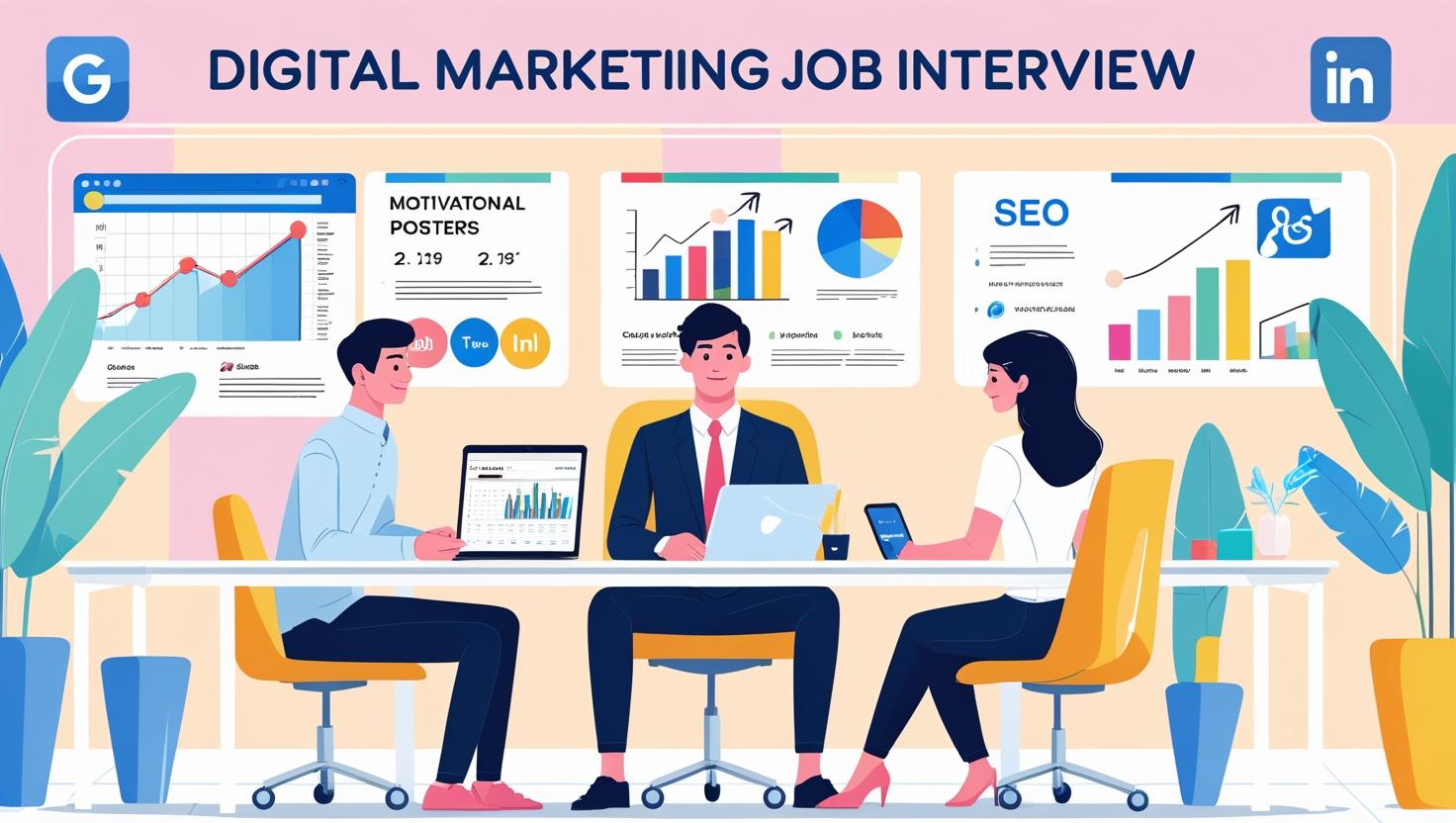
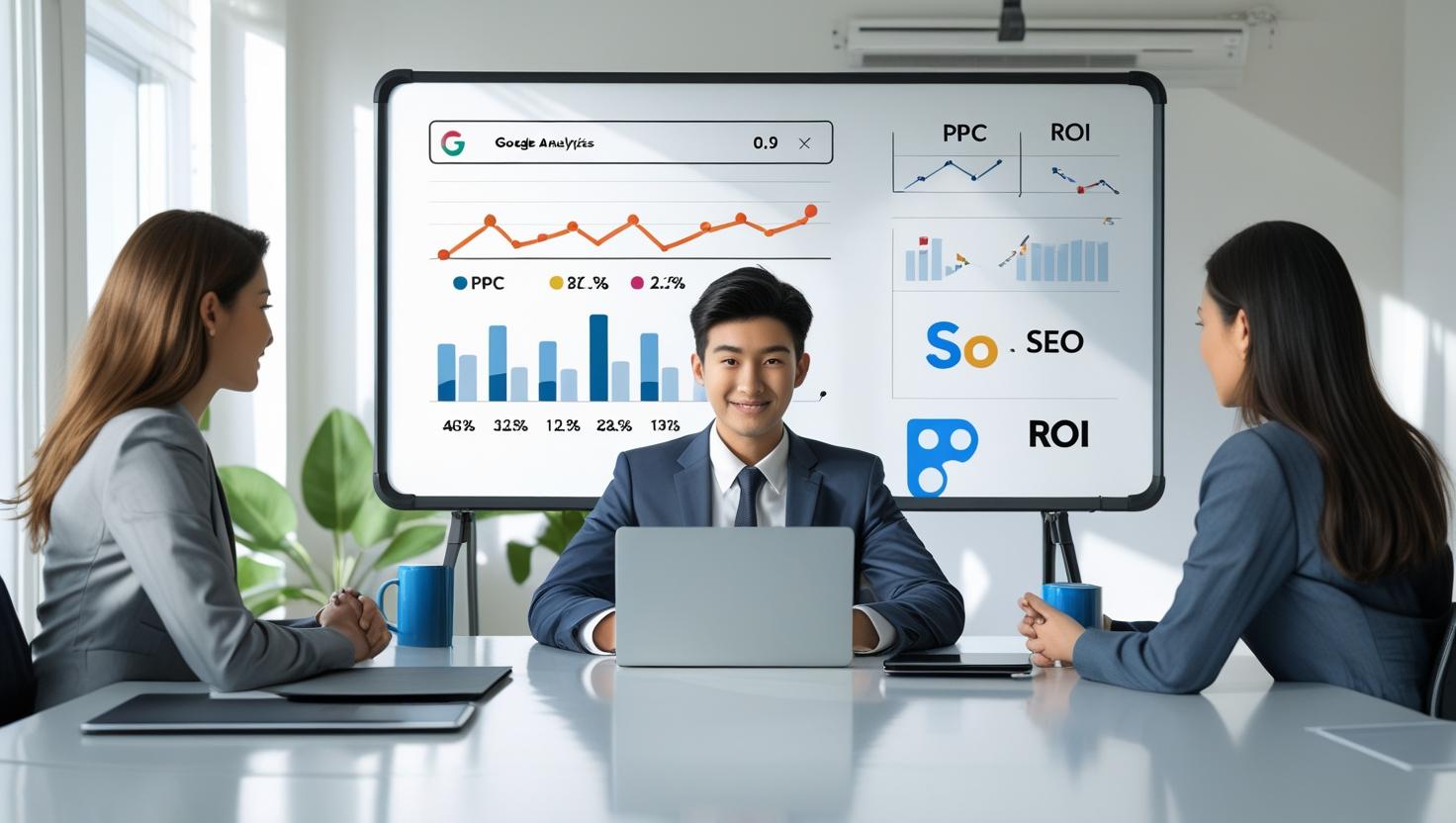




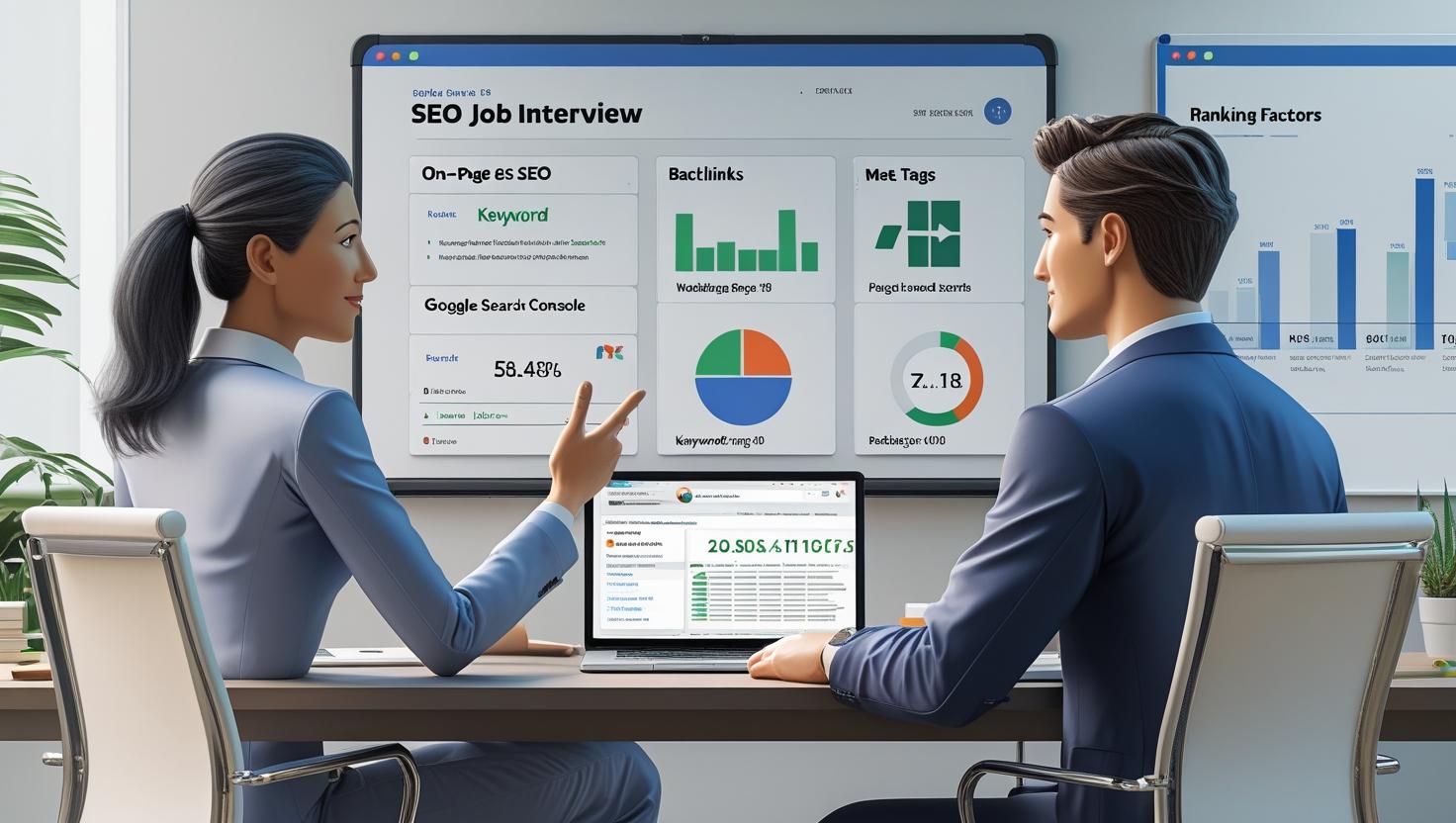
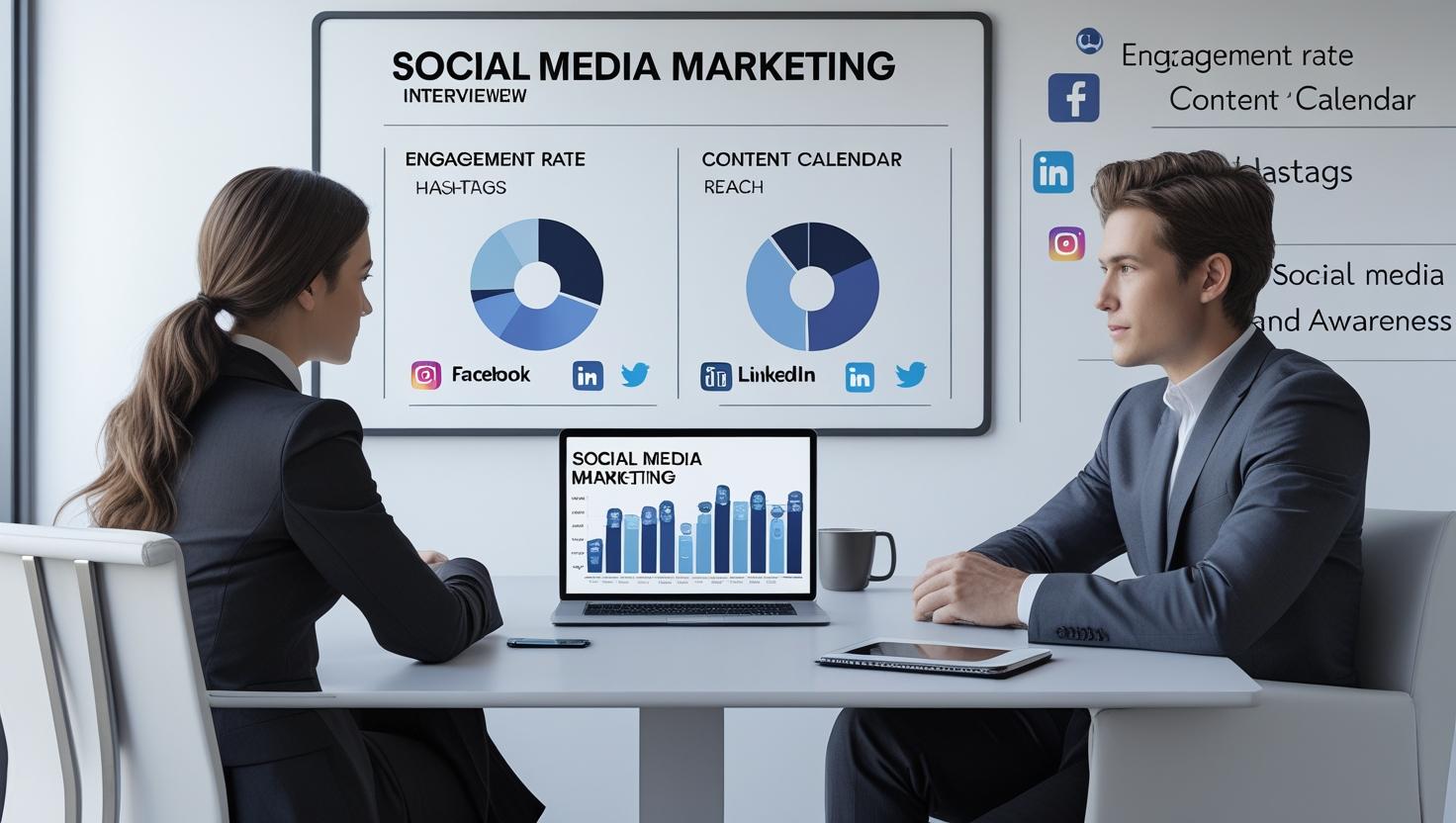


 5.0
5.0





